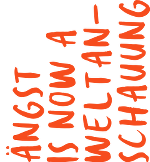Geboren 1967 in Philadelphia, lebt in New York. Unterrichtet am Sarah Law-rence College kreatives Schreiben. Veröffentlichungen in zahlreichen Lyrik-Anthologien, u.a. in „American Poetry: The Next Generation“ und „Legitimate Dangers“. Verfasste mehrere Gedichtbände, zuletzt „Chapel of Inadvertent Joy“ (2013). In deutscher Sprache erschien „Katastrophenkunde“ (Lautsprecherverlag 2006).*
What is the difference between the language of populism in political contexts and the use of exaggeration and stylization within a literary text?
Consequence. Detonation time. Attentiveness. The language of populism in a nationalist context can have an instantaneous impact. Language as bait. Language as scraps of meat dipped in formaldehyde and thrown to the worst part of people. The language of literature is slow. It takes time to form inside the egg (the writer’s head), time to hatch, time to open its feathery sentences, time to fly. And the impact is difficult to gauge.
In America right now we have found ourselves with a president who has hood-winked a third of the population with his blunt use of two-dimensional language, creating in the minds of his brain-scrubbed devoted a world without ambiguity, a world built on fear of the Other: Muslims, blacks, Mexicans, Democrats, the press, football players who don’t kneel, our own intelligence agencies. He obliterates nuance and could convince his followers that the sky is green. Through his mallet-like use of mostly one-syllable words, he has miraculously persuaded many that he is the victim of a Witch Hunt, and that Hilary and Bernie are the ones who colluded with the Russians during the 2016 election.
Maybe Russian literature has provided some context for understanding this jackal. In Bulgakov’s The Master and Margarita, the devil comes to a nation that doesn’t believe in God.
The Russian poet Joseph Brodsky is rumored to have said something akin to: “you Ameri-cans think when the Gestapo comes into your lives, they will kick in your bedroom doors and steal your television sets, but you don’t realize it starts with the language.”
Trump’s tweet is the post-modern bullhorn. He taps and blasts a tweet through cyberspace and it circles the globe like a high-speed Sputnik, sending people into action. He and Fox News are America’s right-wing literature.
In his poem “The Power of Taste”, the Polish poet Zbigniew Herbert writes. when speaking of his oppressors: “Truly their rhetoric was just too shoddy / (Marcus Tullius turned in his grave) / chains of tautologies a few flailing concepts / torturers’ dialect reasoning without grace / syntax devoid of the beauty of the subjunctive // So in fact aesthetics can be an aid in life / one shouldn’t neglect the study of beauty.”
Literature should be a national park of language, an incubator of diction and thought. Litera-ture should provide something you can’t get on television, or in the super market, or in a bottle of whisky, or a lover’s arms, or a fist, or a crack pipe. Through the use of heightened language, literature should occasionally illuminate possibilities of humanity and action.
As writers, language is our medium--the same vowels and consonants, employed by duplic-itous governments. In my poem, The Endarkenment I wrote about this dilemma:
Sometimes I hate this language with its false words
like sunset. The sun does not set. It doesn’t
rise either. It just stays there in one place,
yet we get all romantic huddling on beaches to watch
its so-called departure, when it is we who turn
away from it, which is a good thing—if the sun
could turn, it would never come back, it’d just keep
going, look for some better planet to nourish.
Moonlight is another lie. It’s a luminescent echo.
The moon is a politician whose speeches
are written by the sun. I long for a world
where witnesses must place their hands
on the dictionary when they swear.